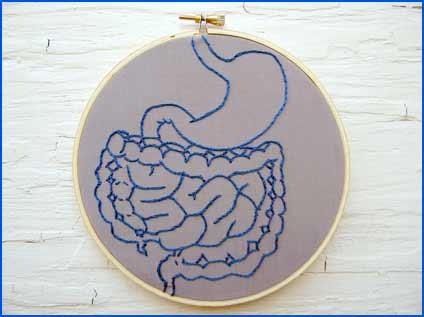
We are discussing a much-neglected topic, the intestines and their flora, the trillions of little beings who live inside us and help all our systems go. Here is a writer who has gone into the subject in depth, so to speak. For AlterNet, Anneli Rufus wrote, “Poop is the Most Important Indicator of Your Health.”
A human has about 22 feet of small intestine and five feet of large intestine, and many creatures live in the digestive tract. A thousand different species of microbes are busy doing their jobs — whatever those jobs might be — inside us.
Most of the intestinal flora can’t be grown outside the body for study, and we don’t know exactly what a lot of them are doing down there. We do know that their effect on the immune system is important, since more than 70% of the body’s immune cells also live in our guts.
Not long ago, associate professor Andrew Gewirtz of Emory University School of Medicine caused a stir by releasing a study about imbalanced gut flora, which can somehow cause the storage of fat and excessive appetite in their hosts. This was wildly extrapolated by an enthusiastic press into a new miracle cure for obesity.
Mice are not people, and this only concerns one type of bacteria, but Rufus quotes the point made by Dr. Gewirtz about not blaming the chubbiness of lab mice on TV advertising:
You can’t ask the mice [why they ate more], but how much they ate was clearly not affected by price or marketing schemes.
The reporter consulted Michael Klaper, a vegan physician, who enumerates all the substances we take in every day that slaughter the friendly inhabitants of our innards. The chlorine in tap water is one, and sure, it kills bad bugs, but it gets the good ones too. Sugar-sweetened beverages often contain phosphoric acid, and Americans are famous drinkers of coffee and tea. Sugar and antibiotics are also the enemies of the good bugs.
Rufus suggests prebiotics, dietary supplements of a particular kind of fiber that doesn’t just bulk up the stool, but also nourishes our beneficial bacteria:
Found in dandelion greens, Jerusalem artichokes, chicory, milk and a few other natural sources, these are soluble fibers that we can’t digest, but our beneficial flora can. In other words, prebiotics (which aren’t alive) fuel probiotics (which are), making them more active and fighting-fit.
Now, the end-product of the intestines has come into the news in connection with childhood obesity. Steve Hodges, M.D., and Suzanne Schlosberg report for The Huffington Post on the problem behind many problems: constipation. Among five-year-olds, to name just one demographic, one child out of five experiences bedwetting or accidents. Dr. Hodges believes that aggressive treatment for constipation can make bedwetting go away:
Based on the clients I see, probably one-third of the potty-trained kids on your street are constipated, and a huge number of them are having accidents and bedwetting episodes because of it.
He describes small children clogged up by grapefruit-sized masses of impacted poop. In this situation, softer stool can still escape around the blockage, and even the most conscientious parent can be fooled into thinking that everything is going well.
But something else might be happening. The unbudging mass in the rectum can press against the bladder, making the child unable to hold urine. It’s something like what happens when a woman is pregnant and has to pee every five minutes.
Feces that stay inside the body continue to decay, and the byproducts can’t be good for a child’s system. The colon can be permanently damaged by stretching, to the point where surgical repair is needed. A lot of this is going on, Hodges says, because of “chronic holding.” Kids at school may not want to raise their hands to ask for a restroom break, or perform their natural functions in a public room where friends are clowning around.
The connection with childhood obesity? By strange coincidence, it turns out that the fiber-poor modern diet which contributes so much to childhood obesity is also a main cause of extreme constipation. The sedentary lifestyle neither burns calories nor encourages the internal organs to function briskly. Cause and effect get all mixed up, because a chronically constipated child will become more sedentary, not feeling well enough for active play.
To top it all off, here is a shocking bit of news for the “Everything you know is wrong” category from Dr. Hodges:
Almost all kids who have difficulty toilet training are constipated before their little bottoms ever hit the potty chair. The most seriously constipated kids I treat are those who trained earliest and with ease. In other words, they’ve been deciding for the longest period of time when they should pee or poop.
Your responses and feedback are welcome!
Source: “Poop is the Most Important Indicator of Your Health,” AlterNet, 03/27/10
Source: “Behind The U.S. Potty Problem Epidemic,” The Huffington Post, 04/04/12
Image by Spec-ta-cles (Spectacles), used under its Creative Commons license.

 FAQs and Media Requests:
FAQs and Media Requests: 











